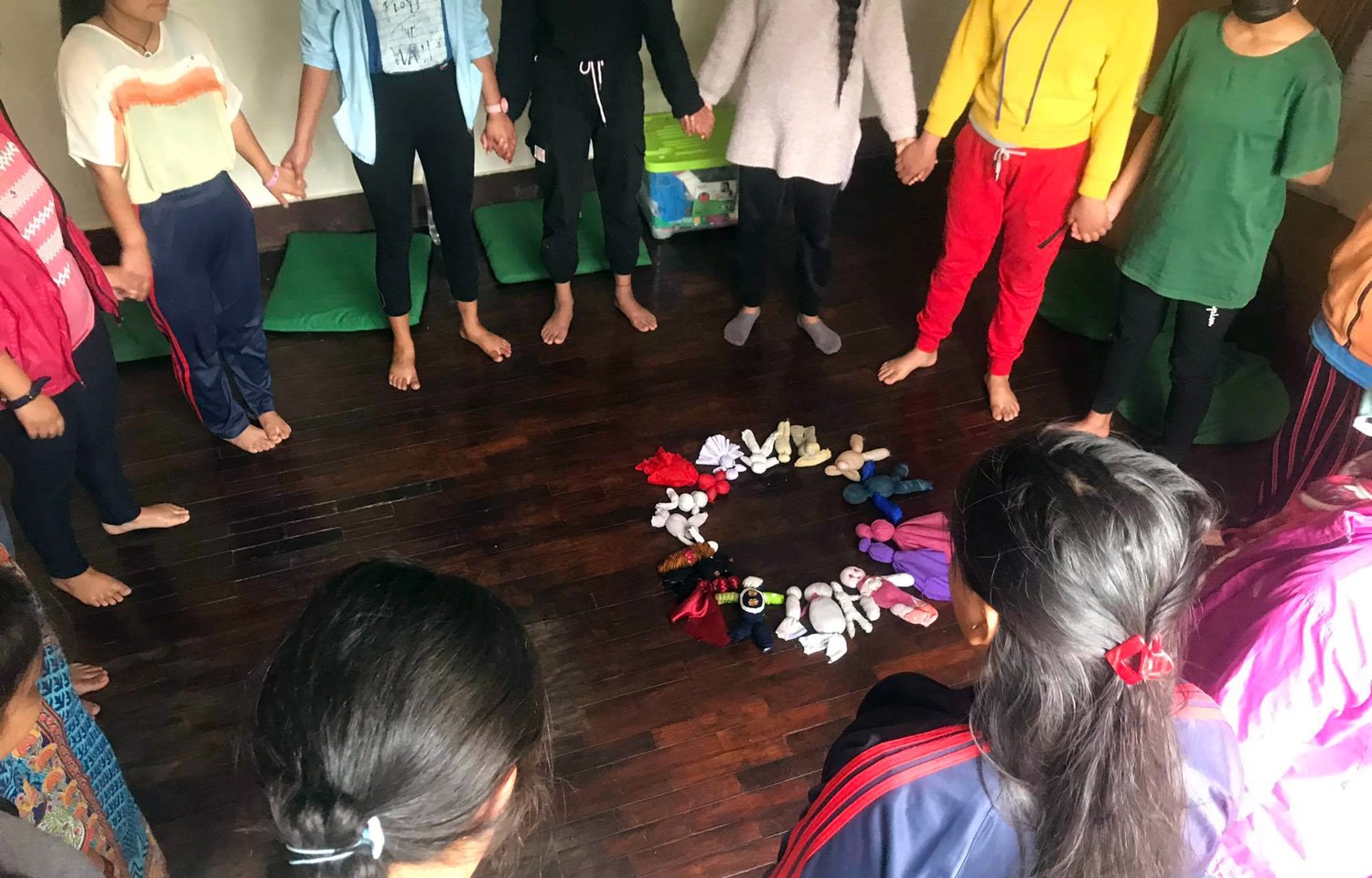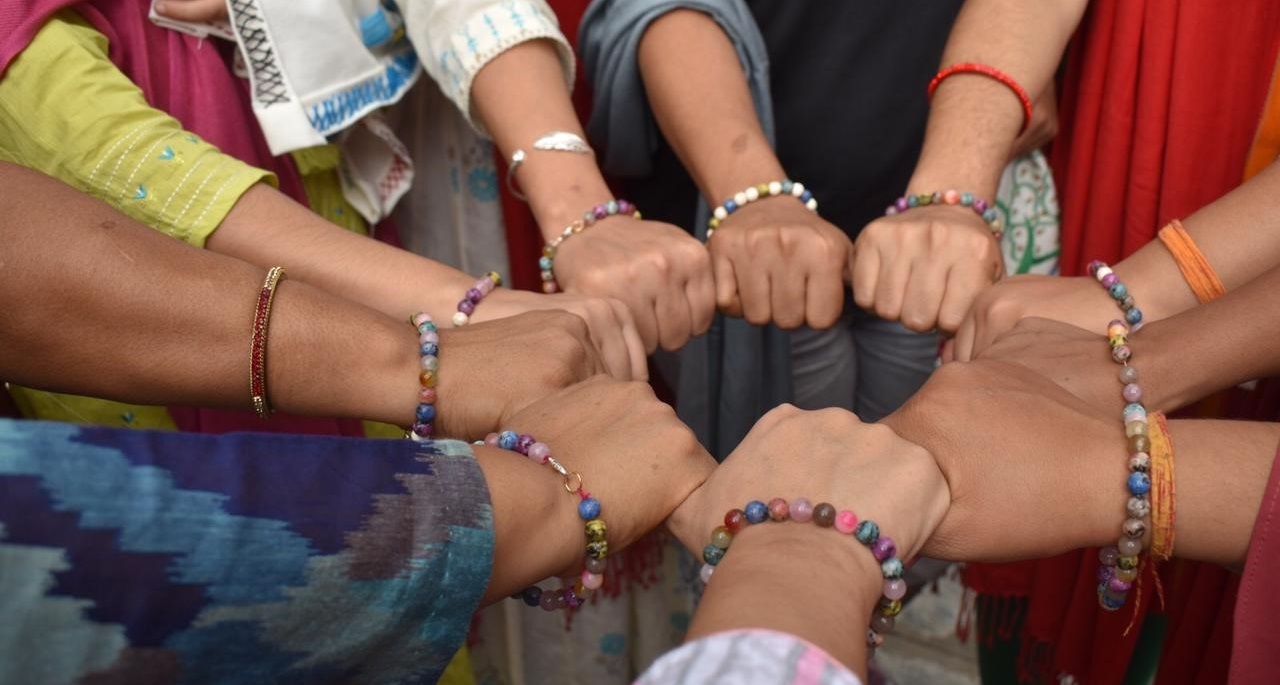
Mission
Common Threads Project helps women heal from the enduring psychological effects of sexual and gender-based violence in the context of war and displacement by building local capacity through training, launching scalable interventions, and promoting efficacy research.
Important Note
Over the next two months, our Featured Projects will focus on the mental health needs of survivors of gender-based violence, each using a different approach to treatment and recovery. Gender-based violence is one of the most prevalent issues faced by women and girls around the world, and it can have lifelong repercussions for survivors.
The topics raised by these projects may be difficult for some Together Women Rise members to discuss. Please consider your own well-being before engaging in this content.
Life Challenges of the Women Served
At least 852 million women and girls are exposed to sexual and gender-based violence (SGBV) globally – and 61 percent have never told anyone. An estimated 48 percent of women in Nepal experience SGBV. Those subjected to such abuses suffer social isolation, stigma, shame, loss of education and income, sexual and reproductive health problems, unwanted pregnancy, psychological distress, and enduring mental health effects. Effective treatment is severely lacking and, tragically, the COVID-19 pandemic has further exacerbated the situation. Not only are women and girls now at greatly increased risk for SGBV, but support services are more difficult or impossible to access.
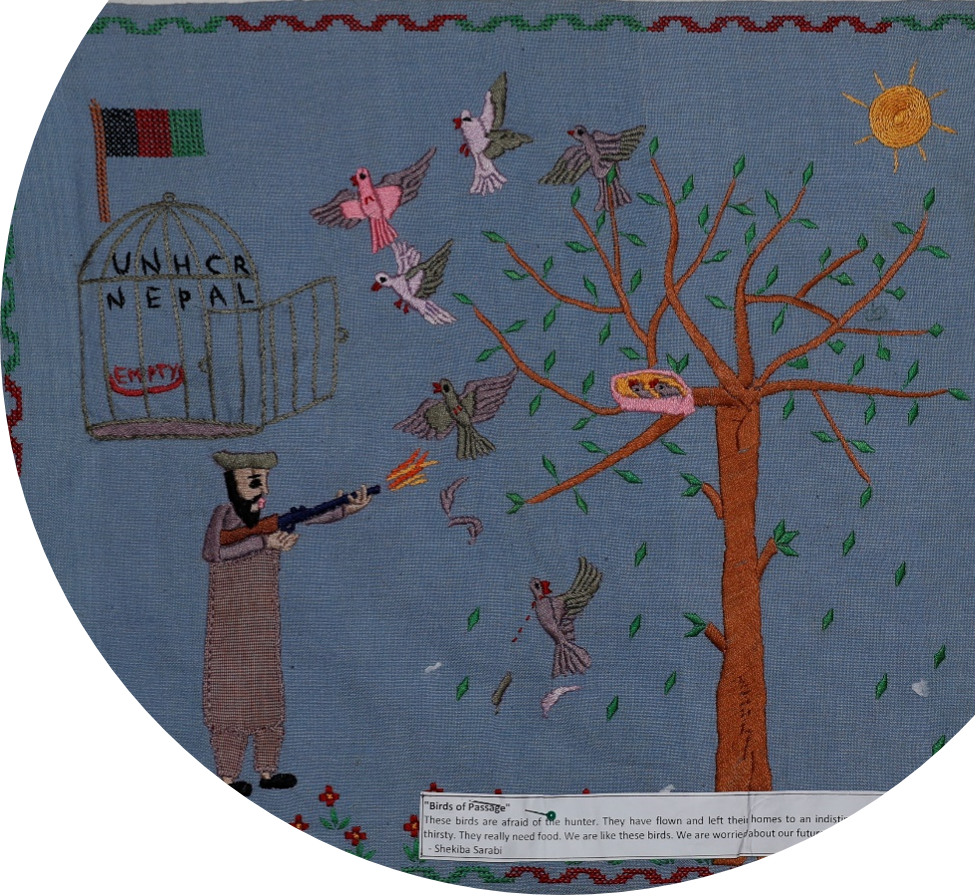 Nepal is an important hub in the global $150 billion a year sex-trafficking industry. The number of human trafficking victims from Nepal has gone up by 500 percent since 2013. Even before the increase, it was estimated that 35,000 girls and women in Nepal were forced and sold into prostitution annually, three out of four under age 18. Although the India-Nepal border has been officially closed during the COVID lockdown, trafficking continues its steady climb. Because resources and personnel have been diverted to monitoring the border for transmission of COVID, the government’s work to protect women and girls has been neglected. Without counter-trafficking activities, traffickers are preying on those who have lost their jobs, homes, and livelihoods.
Nepal is an important hub in the global $150 billion a year sex-trafficking industry. The number of human trafficking victims from Nepal has gone up by 500 percent since 2013. Even before the increase, it was estimated that 35,000 girls and women in Nepal were forced and sold into prostitution annually, three out of four under age 18. Although the India-Nepal border has been officially closed during the COVID lockdown, trafficking continues its steady climb. Because resources and personnel have been diverted to monitoring the border for transmission of COVID, the government’s work to protect women and girls has been neglected. Without counter-trafficking activities, traffickers are preying on those who have lost their jobs, homes, and livelihoods.
The factors that drive sexual exploitation – gender inequality, unemployment, poverty, low literacy, lack of human rights protections, personal history of domestic violence, political and economic instability – have all intensified during the pandemic. It will take decades to address the root causes and to reduce the incidence of sex trafficking and other severe forms of SGBV in Nepal. Meanwhile, tens of thousands of additional girls and women need comprehensive care now to enable the recovery they deserve. If survivors are to regain functioning, self-worth, and reclaim a sense of agency, a comprehensive pathway for healing must be made available.
Without full psychological recovery, survivors often have severe difficulties in daily functioning, continuing their education, and participating in the workforce. As a result, their families and communities suffer. Psychotherapy can be wrongly perceived as a luxury, which is why quality mental health care for survivors of SGBV is severely lacking in humanitarian contexts. The World Bank has called for specialized services including psychosocial counseling, shelters, and a holistic approach for survivors.
The Project
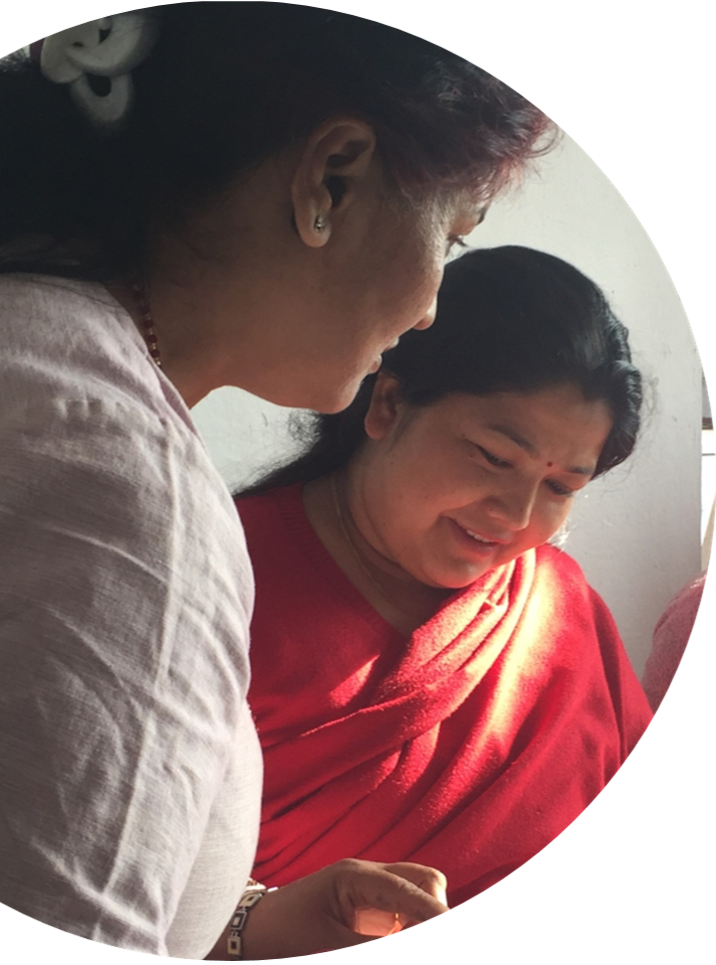 The Sajha Dhago Common Threads Project (CTP) provides deep, transformative trauma treatment to survivors of SGBV in Kathmandu Valley, Nepal, and builds a cohort of local therapists who will carry the program forward. CTP’s innovative group trauma treatment methodology takes inspiration from the ancient tradition of making story cloths to depict unspeakable experiences and integrates this with best practices in trauma treatment. In developing local capacity for provision of quality mental health care, CTP uses a strength-based community approach in combination with professional clinical mentoring and supervision. This project contributes to Together Women Rise’s goals to eliminate gender-based violence and end human trafficking and exploitation of women, and it advances women’s agency by breaking the intergenerational cycle of abuse and inequality, enabling women to heal from trauma, pursue their goals, and participate in educational opportunities and the workforce.
The Sajha Dhago Common Threads Project (CTP) provides deep, transformative trauma treatment to survivors of SGBV in Kathmandu Valley, Nepal, and builds a cohort of local therapists who will carry the program forward. CTP’s innovative group trauma treatment methodology takes inspiration from the ancient tradition of making story cloths to depict unspeakable experiences and integrates this with best practices in trauma treatment. In developing local capacity for provision of quality mental health care, CTP uses a strength-based community approach in combination with professional clinical mentoring and supervision. This project contributes to Together Women Rise’s goals to eliminate gender-based violence and end human trafficking and exploitation of women, and it advances women’s agency by breaking the intergenerational cycle of abuse and inequality, enabling women to heal from trauma, pursue their goals, and participate in educational opportunities and the workforce.
This project expands on Common Thread’s pilot program in Nepal. It benefits women and girls ages 12 – 75 who have been subjected to SGBV, war, and displacement. Their traumas include sex trafficking, rape, slavery, incest, neglect, and child marriage. These women experience stigma, social rejection, lack of legal protection, loss of economic and educational opportunities, and extreme poverty. COVID-19 has brought additional burdens of isolation, related increased risk of exposure to SGBV, and lack of access to support networks and services, as well as direct COVID-19-related risks such as illness and loss of income or home.
Because profound human rights abuses such as sexual violence inflict wounds on the body, the emotions, cognition, interpersonal relationships, and the spirit, CTP has found that all these dimensions of human experience must be addressed. Neurobiological evidence affirms that CTP’s integrative program is the best practice for trauma treatment. Because traumatic memories are encoded and stored in the central nervous system in a different way than other experiences, it is important to employ a nonverbal channel when accessing and healing these experiences. Even in the most challenging circumstances, deep and effective recovery is possible. Significantly improved wellbeing is attainable by enlisting the healing power of the group itself, by engaging the participants’ creativity and strengths, by making use of nonverbal and verbal channels for expression, and by working to restore the body’s system of equilibrium.
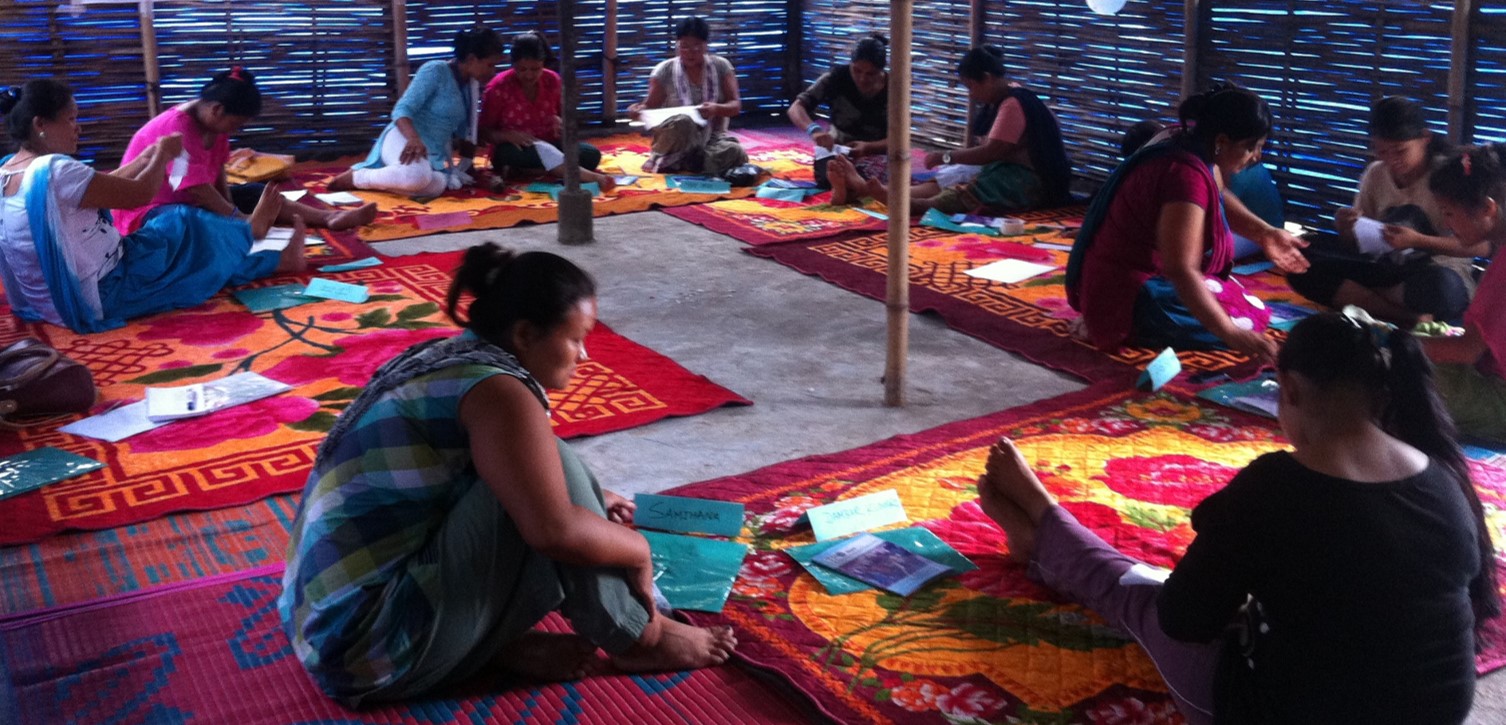
Over the course of the grant year, Sajha Dhago will launch six recovery circles, providing 128 hours of clinical treatment for 90 girls and women who participate in the program. CTP participants progress through three phases of stepped recovery.
Phase One is a three-month intensive program that integrates several therapeutic modalities – activities designed to promote feelings of emotional safety, connection, and trust. As the group sessions proceed, women find a sense of commonality and begin to open up to each other. Facilitators provide psychoeducation about trauma and its consequences. Participants learn specific somatic exercises to gain body awareness, manage intense states, and improve self-regulation. Facilitators introduce therapeutic art activities to encourage freedom in the creative process. By the end of Phase I, each participant has designed and stitched her own story cloth to depict experiences that are difficult to put into words. Gradually, they share these stories with each other within the circle.
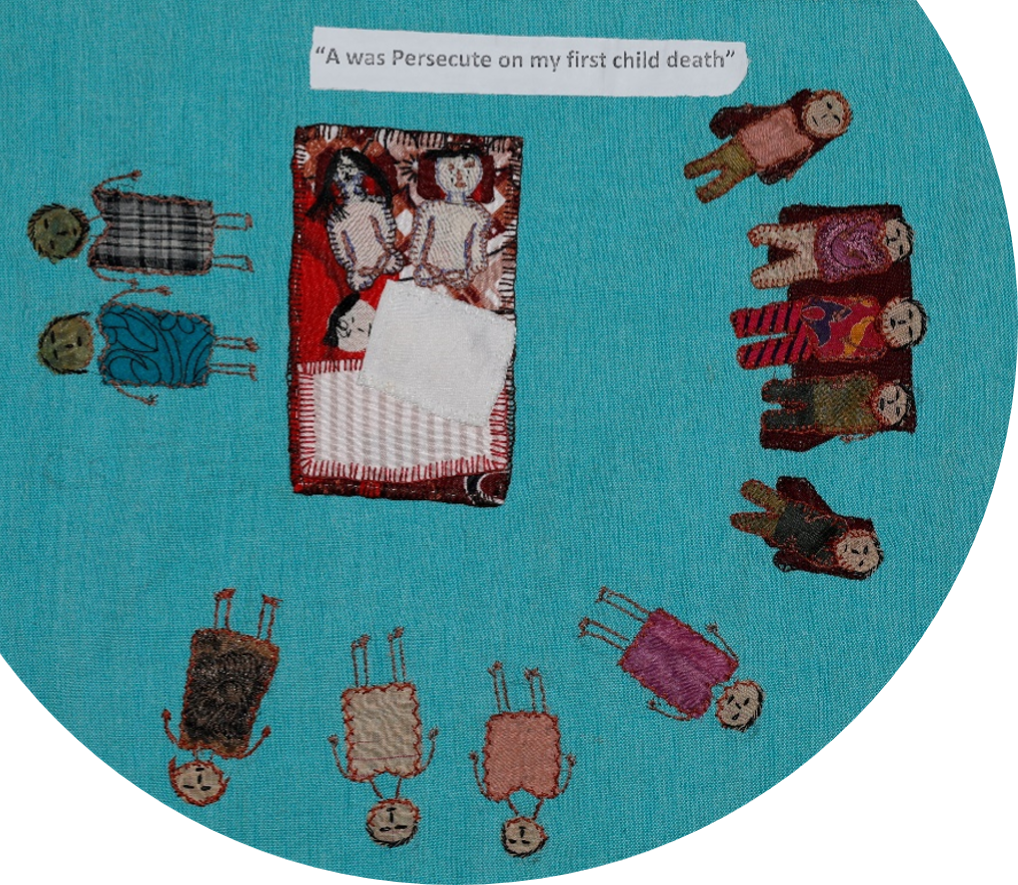 By the end of Phase One, the goals are that participants feel emotionally safe in the group to disclose traumatic experiences, understand how trauma impacts their behavior and relationships, learn coping skills to manage strong emotions and be able to apply self-regulation and self-care effectively, and they will belong to a supportive cohesive group.
By the end of Phase One, the goals are that participants feel emotionally safe in the group to disclose traumatic experiences, understand how trauma impacts their behavior and relationships, learn coping skills to manage strong emotions and be able to apply self-regulation and self-care effectively, and they will belong to a supportive cohesive group.
In Phase Two, the circle works therapeutically on common experiences they have expressed in the first phase. The purpose of this processing of trauma memory is not simply to disclose the story, but rather to be capable of experiencing the story in a new way, without activating the threat response in the body, and without the felt experience of stigma, shame, self-blame, or guilt. During this phase, the circle participants also create collective story cloths in subgroups. These story cloths help shift the group’s focus from the past to the future, such as “These are our hopes for the future” or “This is what we feel proud about.” Because the participants learn to lead activities, the circle prepares itself for independence from the facilitators.
Phase Three: Once participants regain their stability and functioning after the initial six months, they begin to take on leadership roles in the sessions. This phase is a self-organized informal support network of participants who conduct their own community activities, including helping others. The activities are defined by members’ priorities: some circles have focused on income generating activities, some have engaged in women’s rights advocacy, others have organized public exhibitions of their story cloths, some have provided support to subsequent circles as they begin their healing journey.
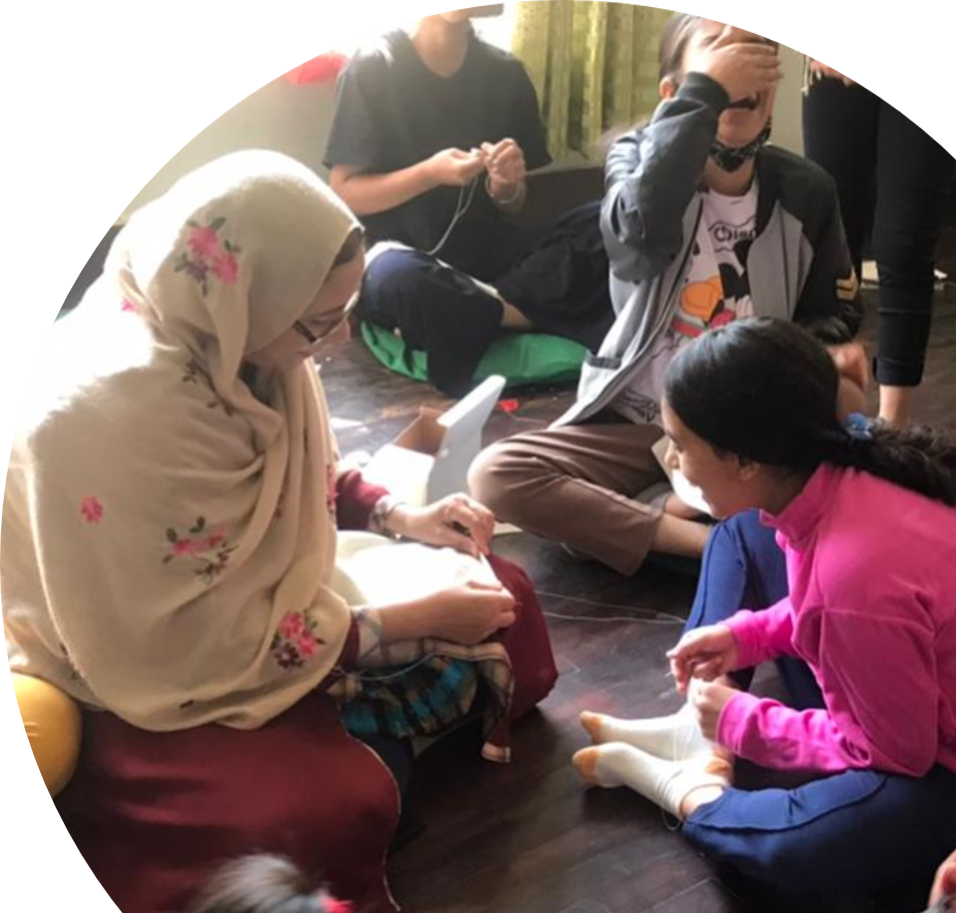 To facilitate this healing, CTP will conduct intensive training and supervision of at least eight skilled Nepali female mental health counselors in the first year of the program. They will receive 30 hours of in-person facilitator training, including fundamentals of trauma treatment, somatic and art therapy techniques, story cloth making, and the therapeutic use of story cloths. During the intervention, training will continue in weekly supervision meetings, clinical case review, and troubleshooting with the clinical team. They will feel confident to facilitate Sajha Dhago circles and half will attain a level of proficiency to supervise and train others in the future. CTP will continue working with these facilitators beyond the first year of the program to develop a well-established and self-sufficient Center of Excellence of Common Threads methodology in Nepal that will keep training and supervising clinicians in the region.
To facilitate this healing, CTP will conduct intensive training and supervision of at least eight skilled Nepali female mental health counselors in the first year of the program. They will receive 30 hours of in-person facilitator training, including fundamentals of trauma treatment, somatic and art therapy techniques, story cloth making, and the therapeutic use of story cloths. During the intervention, training will continue in weekly supervision meetings, clinical case review, and troubleshooting with the clinical team. They will feel confident to facilitate Sajha Dhago circles and half will attain a level of proficiency to supervise and train others in the future. CTP will continue working with these facilitators beyond the first year of the program to develop a well-established and self-sufficient Center of Excellence of Common Threads methodology in Nepal that will keep training and supervising clinicians in the region.
During the one-year project, 94 women and girls will benefit directly and 250 will benefit indirectly. CTP’s local partners Kumudini and Asha Nepal will refer women and girls for participation in the Sajha Dhago program. Women and girls will be selected based on the following criteria: a history of gender-based violence, needing psychotherapy for mental health difficulties, able to commit to a six-month intensive program of recovery. As this program is contraindicated for some individuals, a careful screening will eliminate those who are in acute crisis, actively suicidal, in a life-threatening environment, actively psychotic, or who are aggressive so as to interfere with the group process. Such cases will be referred for more appropriate mental health services.
Common Threads’ methods have been developed in cooperation with local partners and participants from the beginning. All CTP’s programs are implemented in cooperation with local partners with the aim that the project becomes locally owned and scaled up.
94 direct beneficiaries and 250 indirect beneficiaries
UN Sustainable Development Goals
![]()
![]()
![]()
![]()
Questions for Discussion
- Why are locally trained therapists a key component?
- How do you think sexual and gender-based violence affects an entire community?
- How does creativity aid the healing process?
How the Grant Will be Used
Together Women Rise’s grant of $49,368 will help fund the following:
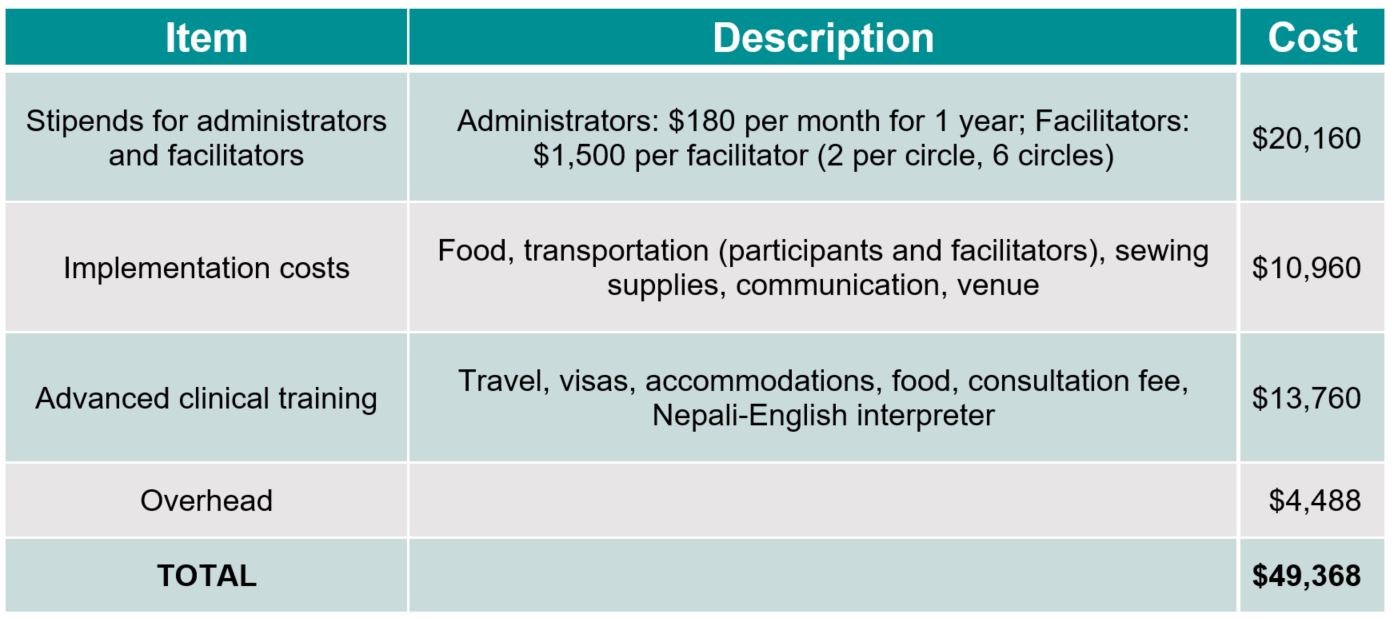
Why We Love This Project/Organization
In the Kathmandu Valley of Nepal during the COVID-19 pandemic, gender inequality, unemployment, poverty, low literacy, lack of human rights protections, personal history of domestic violence, political and economic instability have all intensified, foreshadowing the likelihood of significant increases in victimization. Common Threads Project uses the power of group therapy, the participants’ creativity, verbal and non-verbal modalities, and story cloths for women and girls who have experienced sexual and gender-based violence to recover and thrive. This evidenced-based approach, which is inspired by ancient cultural practices and validated by neuro-scientific understandings of trauma, provides quality mental health care and trauma therapy that is both unique and effective.
Evidence of Success
CTP’s clinical faculty are accomplished and recognized experts in the field of trauma therapy and treatment. Each is licensed to practice in her professional field (psychologists, art therapists, social workers). They are regularly invited to present about this work at international conferences. CTP is accredited by GuideStar and Charity Navigator.
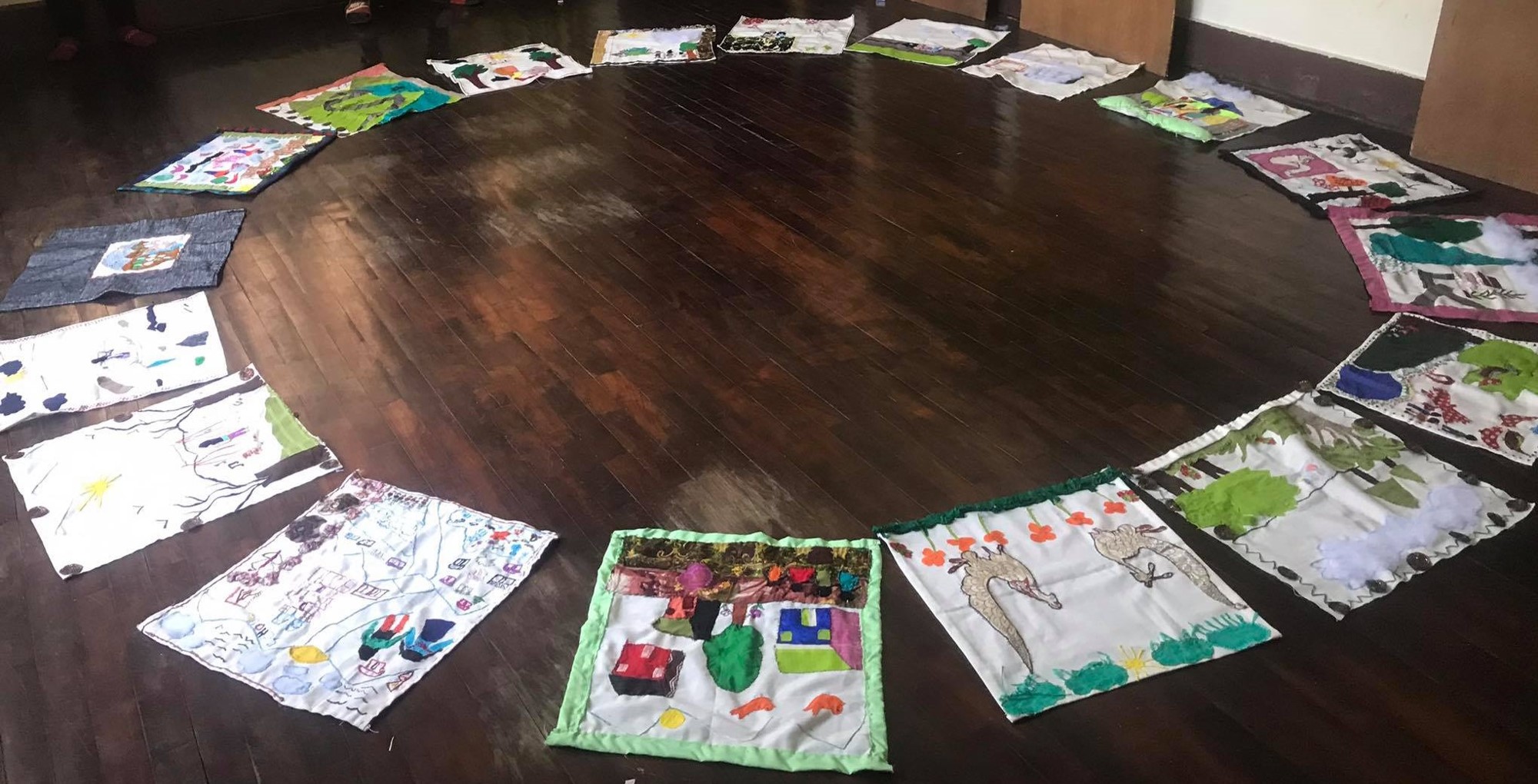
- Key Global Achievements: CTP has successfully applied their methodology in local contexts in four countries: Nepal, Democratic Republic of the Congo, Ecuador, and Bosnia and Herzegovina. They launched major programs in the US in 2021. In collaboration with local partners, they have trained 87 local clinicians and completed 27 long-term healing circles for 372 women and girls.
- In Nepal: Locally trained clinicians in Nepal have conducted 16 Common Threads circles of healing for women since 2014. Nepali facilitators have expanded their work to additional communities, including earthquake survivors, Pakistani, Afghani, Bhutanese and Rohingya refugees, trafficked, exploited, and neglected girls. They have presented at regional conferences to share knowledge and skills. During this challenging COVID year, they initiated their own Common Threads wellness circle to promote resilience for providers of psychological care. They are motivated to create a regional center of excellence in partnership with Common Threads Project.
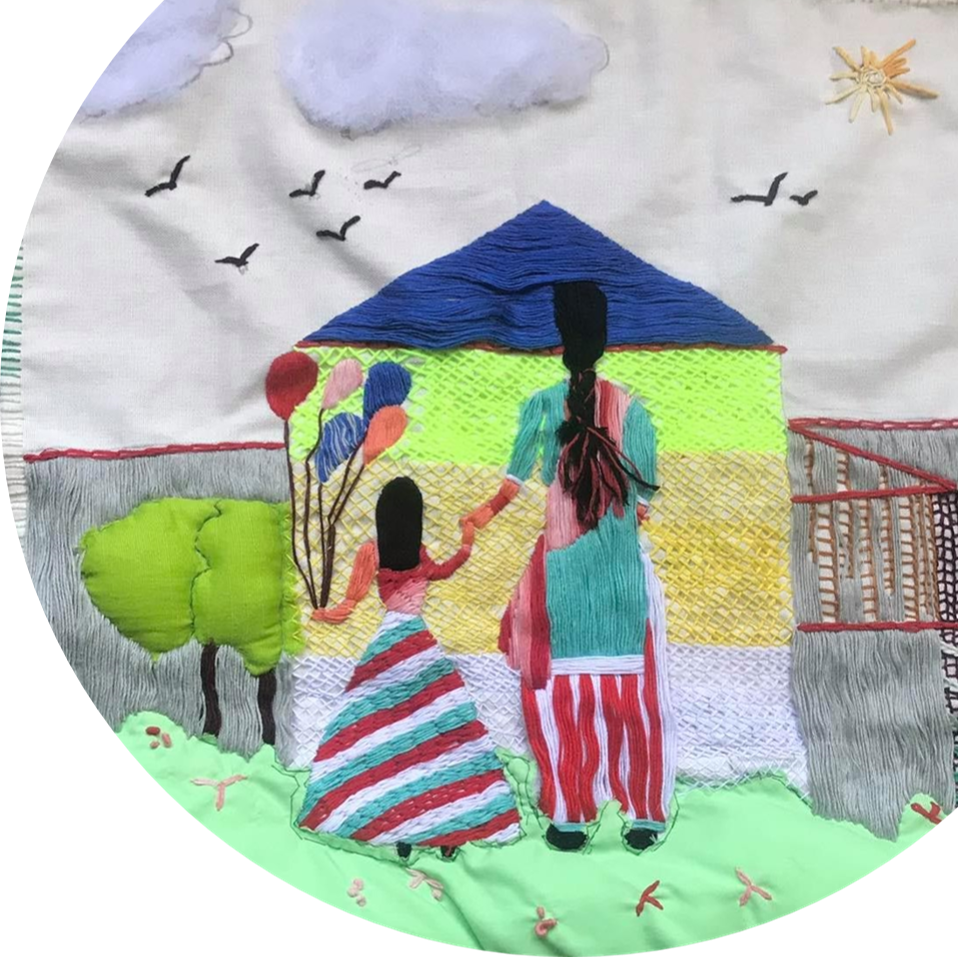 Achievements during COVID-19: CTP’s key mission – to build local capacity for quality trauma recovery therapy – has proven its advantages during the COVID-19 pandemic, when international agencies have limited access to local communities. CTP’s Nepali facilitators and clinicians continue facilitating healing circles with women and girls online and in person when possible. They also organized a healing circle for local facilitators to manage extreme stress and maintain their ability to work with women and girls in need.
Achievements during COVID-19: CTP’s key mission – to build local capacity for quality trauma recovery therapy – has proven its advantages during the COVID-19 pandemic, when international agencies have limited access to local communities. CTP’s Nepali facilitators and clinicians continue facilitating healing circles with women and girls online and in person when possible. They also organized a healing circle for local facilitators to manage extreme stress and maintain their ability to work with women and girls in need.- Clinical Outcomes: Pilot studies of CTP’s programs demonstrate statistically significant decreases in depression, anxiety, and stress-related symptoms from baseline measures to post-treatment. Participants have also shown improved daily functioning, more effective family and community interactions, better capacity for social relationships, greater participation in the workforce, and educational activities.
Voices of the Girls
“The pain we were going through was inside our hearts for a very long time, but we were unable to pour it out in any form. This was a shared pain…. I have tried to reflect the situation because the situation is indescribable. But with this [story cloth] I felt quite relieved.”
“Not only did they have the courage to express their feelings and share with each other, they were able to control their anger as well. Mainly it was found that they gained self-confidence to raise voices against injustice, mentally felt more at peace and overcame depression, learned to make friends and … found a new way of building relationships with others.” – researcher in Nepal
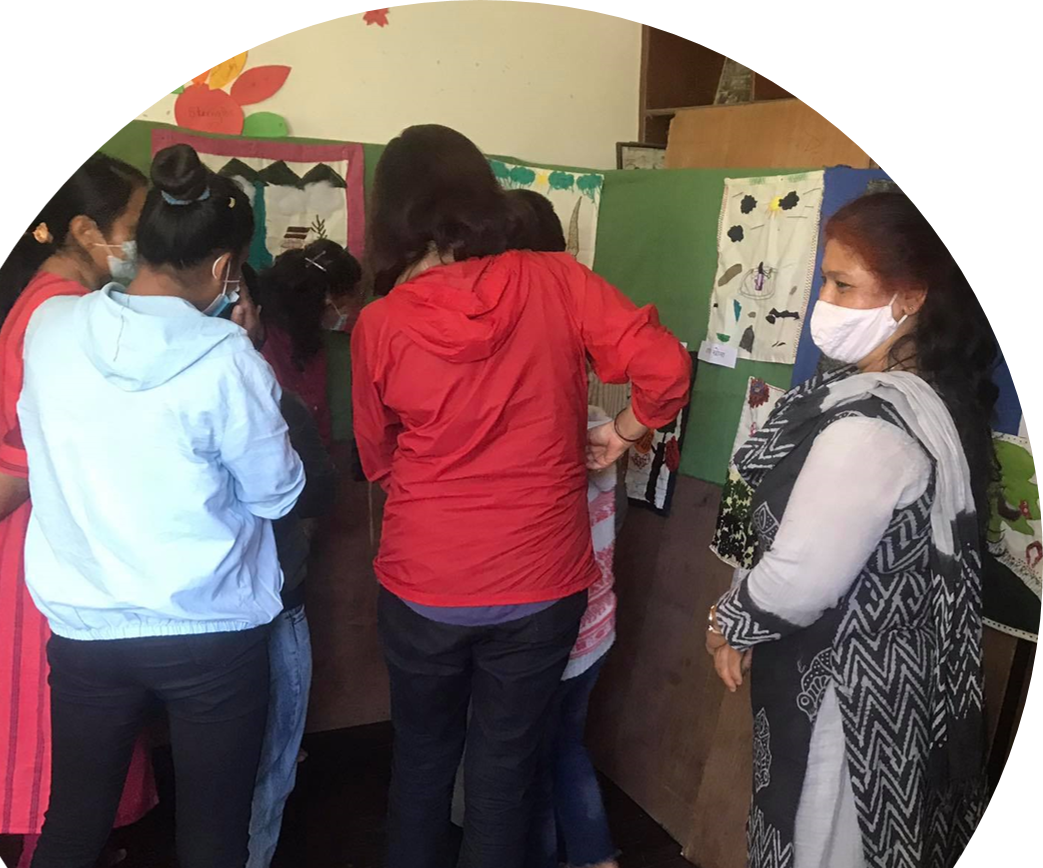 “I used to be disturbed while recalling my past incidents. I always thought about it. But this made us express our stories into a textile and now I don’t feel very disturbed when I express those things. We expressed it in a piece of cloth.” – participant in Nepal
“I used to be disturbed while recalling my past incidents. I always thought about it. But this made us express our stories into a textile and now I don’t feel very disturbed when I express those things. We expressed it in a piece of cloth.” – participant in Nepal
“I was feeling terrible, heavy, desperate, disoriented. I didn’t have strength for anything, in my home and at my work. What I used to do was to cry. Today I feel like a new person. I feel lighter, with more strength to work and to have my own business.”
“Our pain gradually decreased. I feel like a free bird with a positive outlook.”
“I feel we are like a big family, like I have more sisters and that is really encouraging – that moment when you find out that whatever happens you have a group with whom you can share it!”
“I heard some stories and I also have had painful experiences…. but I think there is no reason to be ashamed of that. Now I am clear…what happened to me is not my fault.”
“Previously, when we had problems, we used to run away. But after coming to the CTP program, we came to know that we should not run away from our problems. We realized that rather than running away from problems we should develop solutions to them.”
About the Organization
Common Threads Project was founded in 2012 by Dr. Rachel Cohen in Geneva, Switzerland. As a clinical psychologist specializing in trauma treatment for more than 25 years, she was seeking to develop a comprehensive program to help survivors of war and extreme forms of sexual violence make an enduring and transformative recovery. This is rare or non-existent in the humanitarian context, where survivors cannot expect to receive minimal emergency services, let alone effective care. CTP is currently present in Nepal, Democratic Republic of Congo, Bosnia and Herzegovina, Ecuador, and the United States (Seattle and New York).
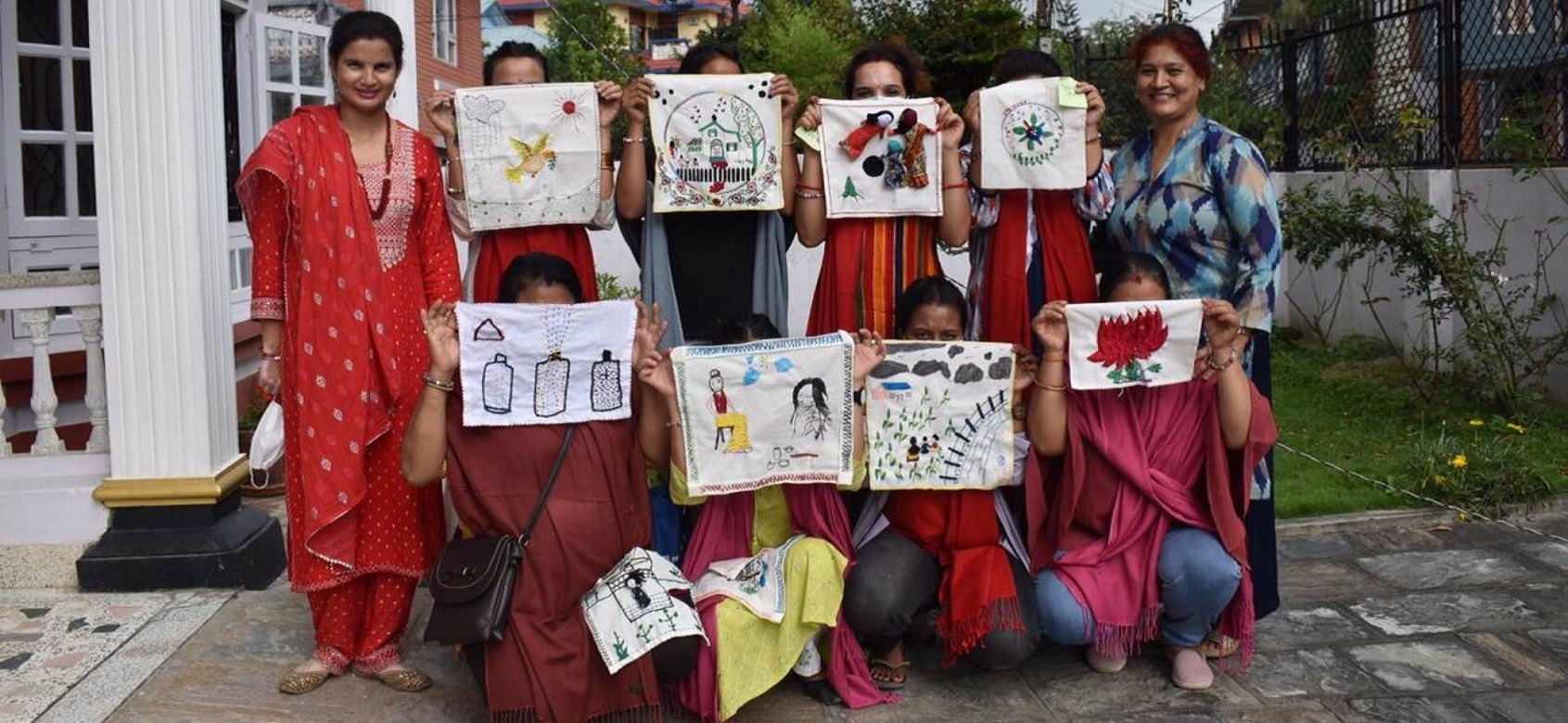
CTP partners with local organizations that provide comprehensive care for women and girls who survive gender-based violence, train their specialists in the Common Threads model of therapy, and support and supervise their therapy work with women and girls through Common Threads healing circles. CTP scales up by enabling local field managers to establish excellence centers where they train other local specialists and provide support and supervision to their work.
CTP launches scalable interventions, meaning their model of care can be implemented on a larger scale. Over time, their partner organizations become independent centers of excellence able to provide effective trauma treatment to women and girls, and train and supervise future clinicians to provide care. CTP furthers the field of trauma therapy through evaluation and research. They develop innovations that are effective in improving mental health and in supporting the empowerment and resilience of women and girls.
Where They Work
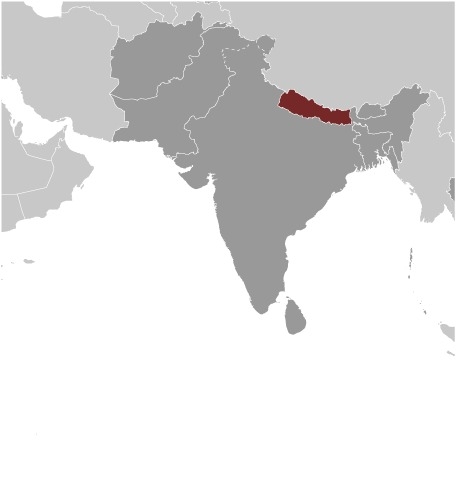
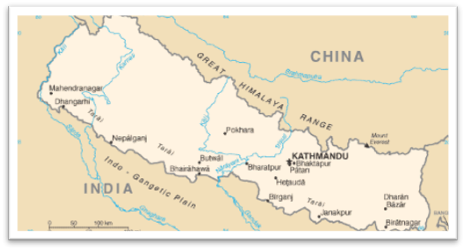
Nepal is a landlocked, mountainous country between China and India that’s about the size of New York. It is among the least developed and poorest countries in the world, with one out of four people living below the poverty line and one out of four children under age 5 underweight. Two-thirds work in agriculture. Nepal’s economy is challenged by its landlocked location, inconsistent electricity, underdeveloped transportation system, and frequent political changes that range from a monarchy to Communism. The 2015 earthquake and COVID-19 crisis have worsened the economic situation. As many as 4 million Nepalese migrant workers endure harsh working conditions in India, Qatar, Malaysia, Saudi Arabia, and the United Arab Emirates.
The population of 30 million Nepalese consists of many ethnicities, with Chhettri (17 percent) and Brahman (12 percent) comprising the largest groups. The official language is Nepali, yet it is only spoken by 45 percent of the population. There are numerous regional languages, including Maithali, Bhojpuri, Tharu, Tamang, and many others. Nepal has the highest percentage of Hindus (81 percent) of any country in the world. Seventy-nine percent of men are literate, but only 59 percent of women.
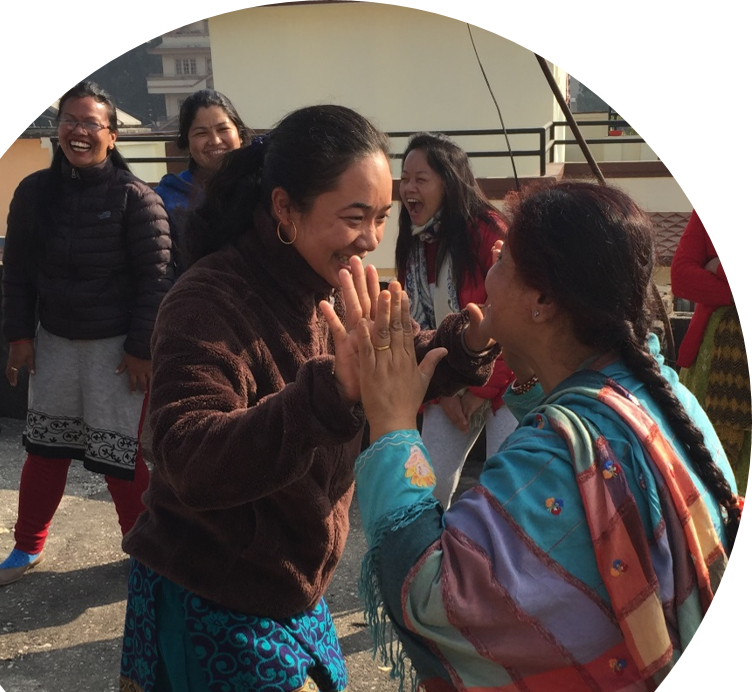 Nepal is home to eight of the world’s ten highest peaks, including the highest point on Earth, Mount Everest, at 29,000 feet. It is also the source of the Ganges river. Summers are cool and winter is harsh in the north, while in the south summer is subtropical and winter is mild. Natural disasters plague Nepal, including monsoons, floods, landslides, and drought.
Nepal is home to eight of the world’s ten highest peaks, including the highest point on Earth, Mount Everest, at 29,000 feet. It is also the source of the Ganges river. Summers are cool and winter is harsh in the north, while in the south summer is subtropical and winter is mild. Natural disasters plague Nepal, including monsoons, floods, landslides, and drought.
The climate varies depending on location: hot and humid in the equatorial river basin, cool and dry in the southern highlands, and cool and wet in the eastern highlands.
A closer look at art and story cloths in mental health interventions
Whether it is drawing, painting, sculpting, music, sewing, or another art form, creativity can be powerful adjunct therapy for survivors of trauma. Art therapy began in the 1940s to help clients get in touch with deep, hidden feelings and experiences. Art therapists encourage patients to talk about images they create and to look for meaning in those images. Combined with talk therapy, it can help trauma victims tap emotions, become fully aware of what has happened to them, and reduce stress and anxiety. Ultimately, it can bring back a sense of self-worth.
Numerous studies confirm the value of art therapy for physical and psychological challenges. It has been shown to reduce pain and improve quality of life for adult cancer patients and reduce fear in child cancer patients. It can also stimulate mental function in older adults who are experiencing dementia and help lift a person’s mood who suffers from depression. It can promote emotional resilience for those who have been experienced trauma or another life-altering experience. Art therapy is often used for post-traumatic stress disorder (PTSD) and related diagnoses.
One of the greatest benefits of art therapy is its ability to help people heal. Every patient is different and creativity and expression are as unique as the patients themselves. Fortunately, for those who have suffered life’s greatest pain and injustices, art therapy can ease their burden and help restore their lives.
Source Materials
https://sageclinic.org/blog/healing-art-therapy/ https://www.canr.msu.edu/news/the_benefits_art_therapy_can_have_on_mental_and_physical_health
https://www.musictherapy.org/research/factsheets/
https://www.cia.gov/the-world-factbook/countries/nepal/
https://www.nationsonline.org/oneworld/nepal.htm
